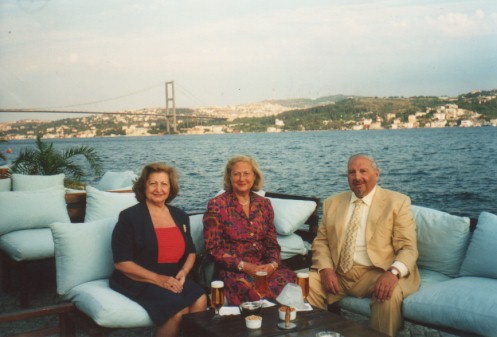Istanbul

Taking
a holiday in Istanbul after finishing The Scribe No. 74
From left: Eileen Khalastchy; Renée and Naim Dangoor
The picture was taken on the terrace of the Çiragan
Palace, one of the old Royal Palaces that has been converted
into a six star luxury hotel.
Istanbul is
the only city in the world that is situated astride two
continents – Europe and Asia, separated by the straits
of Bosphorus which connects the Mediterranean and the Black
Seas. Modern historians believe that one of the main floods
of Antiquity took place in the basin of the Black Sea when
it was a lake and its water level considerably lower than
that of the Mediterranean. Then, one day the pressure of
the higher water broke into the straits and raised the level
of the Black Sea by some twenty metres, destroying all the
cities and settlements around its shores. That may well
have been Noah’s flood since the Bible tells us that
his Ark finally rested on top of Mount Ararat in south-eastern
Turkey. In fact, the remains of a very large wooden boat
are still visible on that mountain today.
However, there
was one difficulty in accepting that story since the Black
Sea receives more fresh water from the European, Russian
and Turkey’s rivers than does the Mediterranean from
its rivers – a fact which should have made the water
level of the Black Sea higher than that of the Mediterranean.
But it appears that the Mediterranean has been constantly
replenished from the waters of the Atlantic since that ocean
broke into the Straits of Gibraltar a million years ago.
To confirm our
findings we asked the British Admiralty in which direction
the water flows through the Bosphorus and were readily told
that it flows from the Mediterranean to the Black Sea.
During our visit there we asked the guide the same question
and were given a more detailed and interesting answer: there
are two currents in the Bosphorus flowing in opposite directions.
A top current of sweet water flows from the Black Sea to
the Mediterranean and a lower current of salt water flows
from the Mediterranean to the Black Sea. This put the whole
situation in proper perspective.
During its ascendancy,
the Empire of the Ottoman Turks was very liberal and tolerant
of other traditions and nationalities thus, when they finally
occupied Constantinople in 1453 after a long wait, they
did not change its name but kept the name of Constantine
the Great, the Emporer who had made Christianity the official
religion of the Roman Empire. But in its declining years,
the Ottoman Empire became irritable and intolerant and became
known as the sick man of Europe. The Great War of 1914-1918
stripped it of most of its possessions, restricting it to
the Peninsula of Asia Minor.
After the Revolution
of Kamal Ataturc in 1923, Turkey has traced for itself a
new future in the politics of Europe, Asia and the Middle
East. Turkey will play an increasingly important part in
the destiny of the region.
If
you would like to make any comments or contribute to The
Scribe please contact
us.